If you are seriously wanting a Danny Boyle film, Steve Jobs isn’t it. It is, I suppose, to Boyle’s filmography what Room Service (1938) is to the Marx Brothers — a film with them, but not a Marx Brothers movie. What we have here is Danny Boyle efficiently and slickly (and seemingly dispassionately) capturing an Aaron Sorkin screenplay with an endlessly moving camera — and an occasional “subliminal” cut — disguising the fact that it’s largely two hours of talk — mostly delivered at breakneck speed and often shouted. It doesn’t so much reinvent the biopic as it breaks it into a series of anticlimactic acts and talks it to death. It is Steve Jobs Sorkinized. Forty years ago, it might have been Chayefsky-ized. I’m not saying it’s bad, but your take on it will be more than slightly determined by how much you like Sorkin’s style of writing. And I am less worshipful of his bombastic verbal shenanigans than I’m supposed to be. As a result, I am not as keen on Steve Jobs as might be expected.
It is, however, worth noting that I found the film almost compulsively watchable, even while not particularly persuasive. (It is almost certainly nothing I will feel the need to watch a second time. Citizen Jobs, this is not.) Sorkin’s big attempt at breaking away from the biopic form consists entirely of its three-act structure surrounding the launches of the Mac in 1984, the NeXT cube in 1988 and the iMac in 1998. Actually, it doesn’t depict the launches, but only the moments leading up to those launches, with the film skipping to the next launch before the presentations. If that seems like a whole lot of foreplay, without much in the way of consummation, that’s because it is. It’s a backstage show without a play. (This will not keep the film from delivering a standing ovation for Jobs at the end.)
Sorkin’s realistically improbable, but dramatically viable, hook is to stage high-powered conflicts with the same collection of people in each instance — Steve Wozniak (Seth Rogen), Joanna Hoffman (Kate Winslet), John Sculley (Jeff Daniels), Andy Hertzfeld (Michael Stuhlbarg) — with ex-girlfriend Chrisann Brennan (Katherine Waterston) and daughter Lisa (played by Mackenzie Moss at five, Ripley Sobo at nine, Perla Haney-Jardine at 19) hovering around the edges. I give high marks to how effectively (if simplistically) Sorkin sketches them in, but they are inevitably fated to end up being steamrolled by the towering arrogance and narcissism of Jobs (Michael Fassbender) — much like their real-life counterparts. More troublesome — especially for a movie wants to reinvent the biopic — is that ultimately it’s reduced to a domestic drama about Jobs and his daughter. How much more old-fashioned can you get?
Yes, the performances are all solid — even more than solid in many cases. Yes, Sorkin’s dialogue contains some well-placed zingers. Yes, Boyle keeps it all moving at a pace that sometimes keeps the talkiness manageable. But does it bring anything new to bear on the subject of Steve Jobs? On the contrary — it relies very much on what the viewer already knows. Unless you’ve seen Alex Gibney’s documentary, Steve Jobs: The Man in the Machine, released a month ago, or are otherwise well-versed in the Jobs legend — things that allow you to read between the lines — it offers little other than the comfort of a narrative format. I went in knowing that Jobs was a pretty miserable human being who had the knack to envision technical innovations and the staff to make those ideas work. That’s about what I knew on the way out — except for the almost certainly fabricated reason behind the creation of the iPod. Rated R for language.



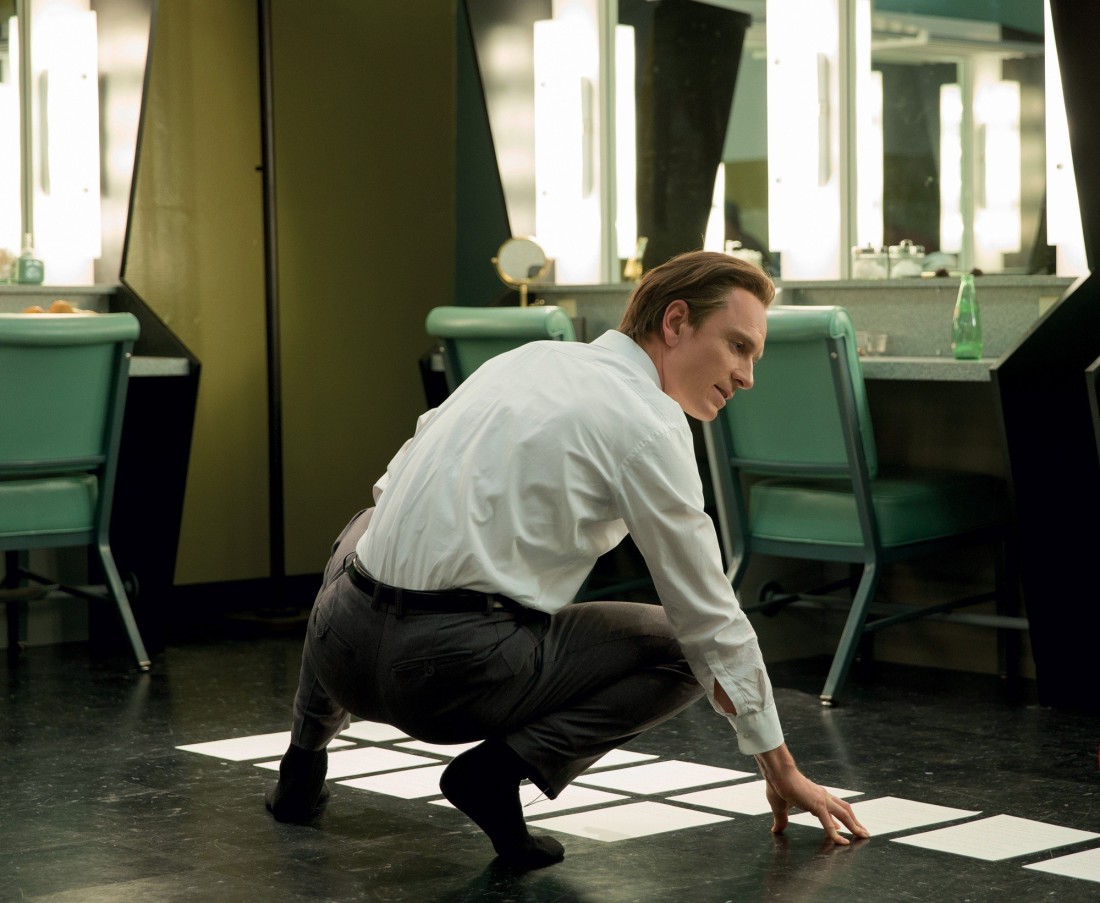
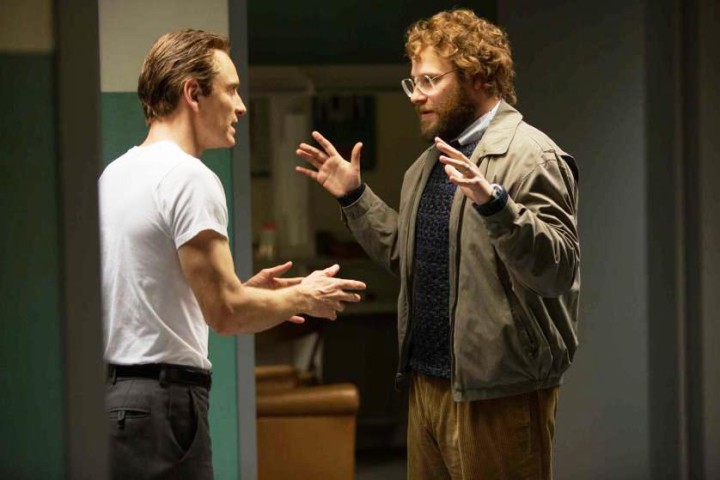
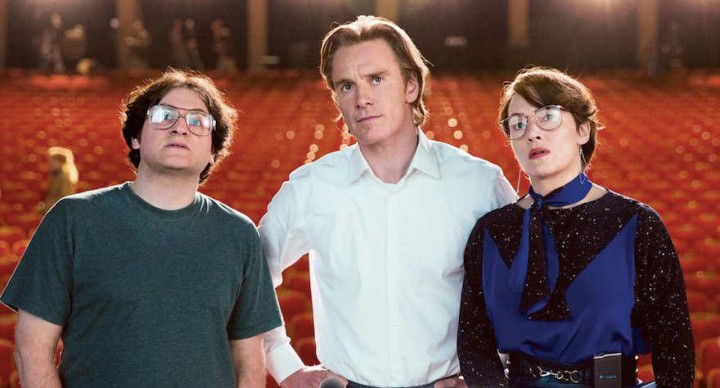
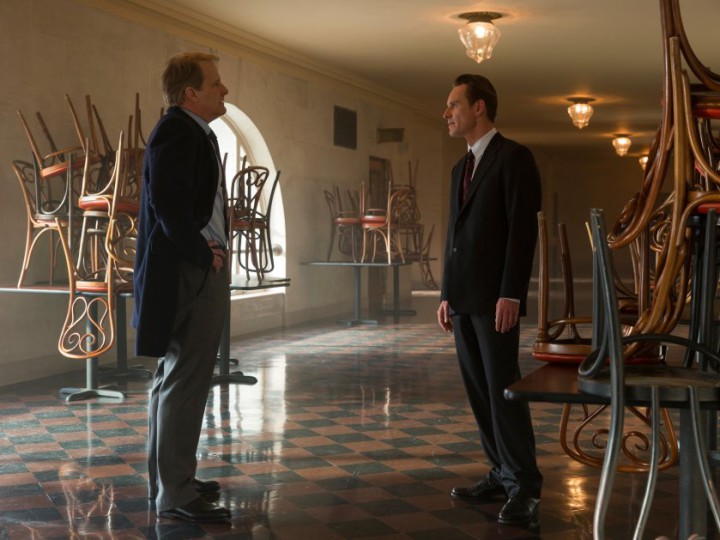
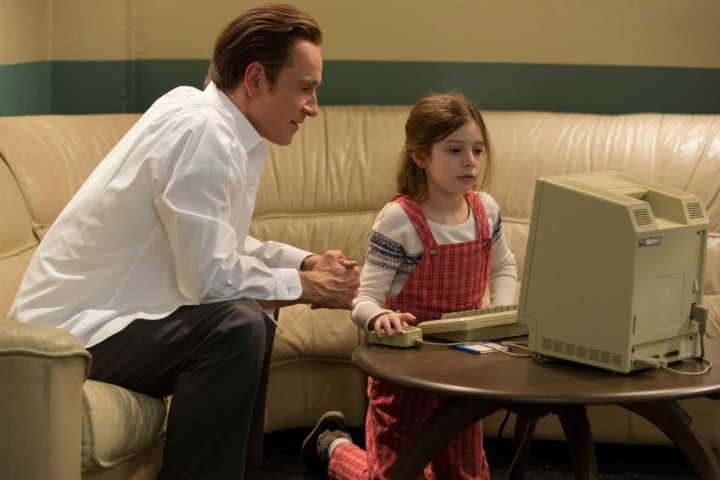
Great director, great cast, and Im sure it will win lots of praises and awards. After it does, please Hollywood, no more movies about Steve Jobs. Hows this compare to the Kutchner version? (and no more Ashton Kutchner movies either, Hollywood)
Yes, it’s better than Jobs, which is not nearly as bad as its reputation suggests.
How’s it compare to iSteve, is what I want to know.
That may actually be a fair question.
“I’m not saying it’s bad, but your take on it will be more than slightly determined by how much you like Sorkin’s style of writing.”
I am pretty sure this style of writing is not for me. The writing was a sledgehammer driving home the point of the dickishness ( will the filter let this through?) of Steve Jobs. Yawn. It was almost didactic, lecturing us on the evils of singlemindedness. I napped a bit, then woke up during the big showdown with Steve Wozniak just before the end. There was a hint of redemption there, but not enough to merit two hours of my valuable time. Michael Fassbender was complex and suitably volatile. ( He also stirred the libido at times with his chiseled cheeks and mystery man persona)
I don’t worship Jobs although some of my friends do. (one swears that his Apple products stopped working as smoothly the moment Jobs died) But this movie painted him as almost sociopathic in his quest for control. Honestly. I craved a little nuance in this film.
I do find the idea of Apple products stopping working when Jobs died quaint in a “But it stopped short, never to go again when old Steve died” manner. In fact, I suspect an entire new set of lyrics to “My Grandfather’s Clock” built on this concept should be undertaken.
A friend of mine remarked, “Wozniak is a genius, Steve Jobs was a used car salesman,” and honestly I tend to agree, though I think that may be a little extreme. If nothing else, Jobs was a brilliant marketer — even if the main thing he marketed was himself. Yes, this is coming from someone who has never owned a single Apple product and who used to groan when he had to go do anything at the paper, because it meant working on a Mac, which is only user-friendly if it’s what you’re used to. Jobs himself always gave me the creeps — and the cult of Jobs plainly horrifies me.
My problem with Sorkin is a combination of the problem I always had with Paddy Chayefsky — namely that he’s always shouting — and, to a lesser extent, the one I have with David Mamet — a sense that he spends five minutes honing a line and 10 minutes patting himself on the back for it. For me, it’s a style of writing that becomes numbing, because it rarely delights me with surprise, and always does what I expect it to.
My overall problem with the film is less nuance than a lack of context. It wants you to read between lines that aren’t there. Take the scene with the giant behind the scenes photo of Alan Turing, who is kept behind the scenes because he lacks immediate recognition value. That’s fine as far as it goes, but it doesn’t get at the real issue of Jobs branding himself as a genius by using photos linking Macs — and be extension to himself — to recognizable geniuses like Einstein and Lennon. It’s genius by association, not by merit. The film seems to think that the viewer understands that, and I doubt that’s quite true.
“but it doesn’t get at the real issue of Jobs branding himself as a genius by using photos linking Macs — and be extension to himself — to recognizable geniuses like Einstein and Lennon. ”
Hmm. It is a marketing ploy to set up an audience for something groundbreaking and thrilling. That part of the film didn’t really bother me. I got weary of cringing was kind of the bottom line for me.
I could somewhat appreciate blending the almost unforgivably controlling man behind the curtain with the reluctant father. But the lack of humanity was so one note that it became redundant. Wasn’t it possible to see more of the idea sessions so that there would be more levels to the film?
Your comment about Macs being user friendly only to those who use them was perfect. Of course I have an allergy to PC’s. I hate all of the virus popups. I could go on, but it won’t change you into a mac man.
Hmm. It is a marketing ploy to set up an audience for something groundbreaking and thrilling.
The iMac groundbreaking and thrilling? No, I think it’s to brand their titular creator as on a par with Einstein and Lennon — and your hardcore Mac friends are a testament to the fact that it worked.
But the lack of humanity was so one note that it became redundant.
Is it possible that that’s the only note there was?
Your comment about Macs being user friendly only to those who use them was perfect. Of course I have an allergy to PC’s. I hate all of the virus popups. I could go on, but it won’t change you into a mac man.
In 24 years of using PCs I have never had a virus. Now, what I have had were perfectly workable machines that I could walk into a store and easily replace at a much more reasonable rate than Macs. And since I’ve no need of any of the other iProducts, there’s no draw for me.
Is it possible that that’s the only note there was?
Well we differ on this. The screenwriter is the storyteller. No one is one thing. The writer did himself a disservice by structuring it as a three act play. All one scene. All portraying Jobs in one note. So I blame Sorkin more than anyone. Fassbender did his best to create inner conflict.
Well, anyone who structures a movie as a three act play is asking for trouble. I’m certainly not letting Sorkin off the hook here. The place where you and I aren’t meeting is that I get the feeling you want a more sympathetic Jobs and I’m unsure there is one.